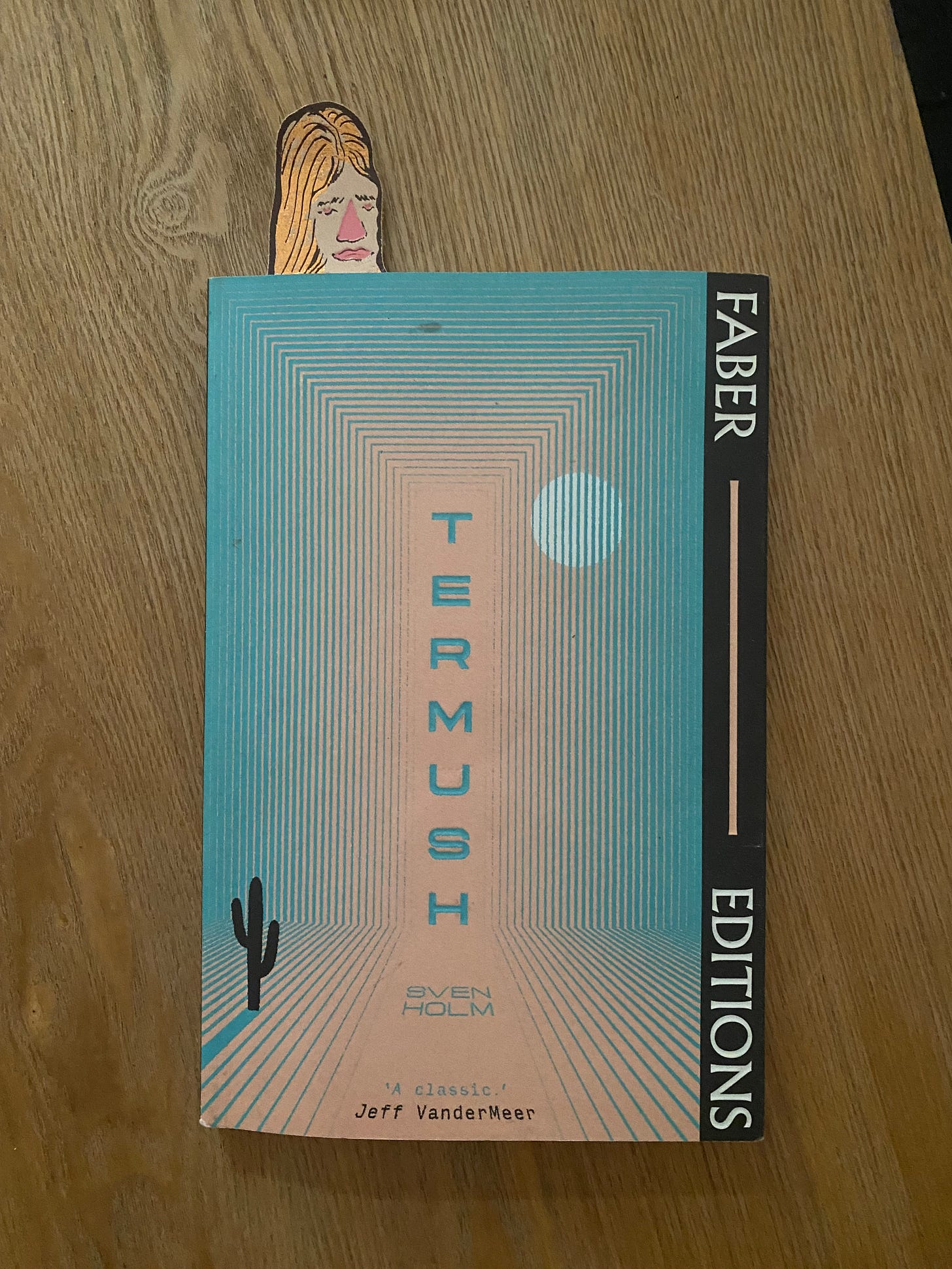📖 BOOK CORNER📖: Termush is a warning to the world's preppers
Sven Holm's depiction of an apocalypse hotel is a short and spare read that exposes the futility of the 1%'s escape plans
“We paid money to go on living in the same way that one once paid health insurance; we bought the commodity called survival, and according to all existing contracts no one has the right to take it from us or make demands upon it.” – Termush, Sven Holm
“The billionaires considered using special combination locks on the food supply that only they knew. Or making guards wear disciplinary collars of some kind in return for their survival.” – Douglas Rushkoff
“You can be sure that you, your family and your most treasured possessions have a place of safety and comfort close at hand for as long as you need, whatever happens in the world outside.” – Oppidum
If you’re a normal person, the end of the world is horrifying. If you’re a rich person, the end of the world is still horrifying but with a side serving of boredom and delusion.
Such is the premise of Sven Holm’s 1967 novel Termush, recently reissued by Faber. It’s a short and spare read, set in the wake of an unspecified nuclear disaster that’s left the land devastated. The book’s narrator is holed up in the eponymous Termush – a hotel that’s been converted into an apocalypse resort for the lucky and (we assume) wealthy few.
Lured by the promises of a glossy brochure, the hotel’s guests have assured themselves a cushy post-disaster life. Inside the clifftop hotel, they’re waited on by staff, served brandy and protected from the radiation that’s sweeping the surrounding country. At semi-regular intervals they’re ushered into Termush’s subterranean shelters, to wait for the all-clear. Otherwise, life consists mainly of rearranging furniture and waiting for news from the reconnaissance team exploring the outside world.
Holm depicts an experience that as tedious as it is claustrophobic. Termush’s guests are only allowed as far as the hotel gardens, which are subjected to a daily regime of soil turning and cactus-washing.
Otherwise, they’re bound to their bedrooms, the communal areas or the damp, concrete shelters beneath the hotel. The unbearable closeness of things becomes particularly clear on a one-off boat trip, organised by hotel management, in which the sight of the vast Atlantic Ocean reduces some of the guests to hysteria. Holm is at his best when he’s mixing the terror of the situation with the sheer, farcical nature of things - who in their right minds hops on a yacht, mid-apocalypse, to sip chilled white wine?
Despite the Termush inmates’ best efforts, the horror still intrudes. The narrator describes hallucinations and dreams that hint at what’s really going on – imagery of dead fish washing up from the sea and people with blank faces. He also envisions the fused, charred state of the world outside the hotel:
“We gaze at the dark mass, where buildings, streets, hordes of people, wide stretches of country with farms and herds of cattle are set solid like flies in amber; a hand has gripped a bottle of beer, one can no longer tell the difference between the hand and the bottle; one face has turned to another and the two faces are forever grafted together.”
Dead bodies appear on the steps of the hotel, fallen birds litter the garden and – although hotel management “realises that the harrowing sight of injured and distressed people must be a strain on the guests” – survivors begin turning up to demand help.
Holm depicts a group of people that feel, in turn, astounded that others are intruding on their safety, vicarious about their own survival, and outraged that their precious reserves might be shared with the sick. It’s the same kind of delusion and paranoia that’s led to the wave of wealthy people investing in disaster bunkers, thinking that they, somehow, will be exempt from the apocalypse.
It calls to mind writer and filmmaker Douglas Rushkoff’s 2022 book Survival of the Richest: Escape Fantasies of the Tech Billionaires. In it, he recounts an invite to address a group of the ultra-wealthy, desperate to pick his brains on how they can a) survive the apocalypse – euphemistically described by them as ‘the event’ – and b) ensure loyalty from their staff when it happens. Despite his advice to embrace a bit of human solidarity instead, they don’t grasp the reality of the situation. “Don’t just invest in ammo and electric fences, invest in people and relationships,” he writes in an extract published by The Guardian. “They rolled their eyes at what must have sounded to them like hippy philosophy.”
In a similar vein, Holm writes about the sheer disbelief experienced by the Termush guests that they haven’t been able to buy themselves a ticket out of things. Ultimately, the hotel is less a sanctuary and more a prison, with the very people hired to protect the guests devolving into their keepers. Bunker buyers, read it and weep.
Things I enjoyed this week:
Ex-Stardew Valley game developer Arthur ‘Mr Podunkian’ Lee is releasing a city sim, and based on Stardew’s success (20m sales, around $300m of revenue) it’s going to be a whole big thing.
Chat GPT is coming to your VW.
Horizontal video is making a comeback, and if TikTok continues along these lines they’re about six months way from inventing the feature film again.
Shoe brand Vagabond is now a foundation, and plans to use company profits for research, education and charity.
Anguilla is making MILLIONS from selling .ai domains - sales are now a third of the government’s budget.





